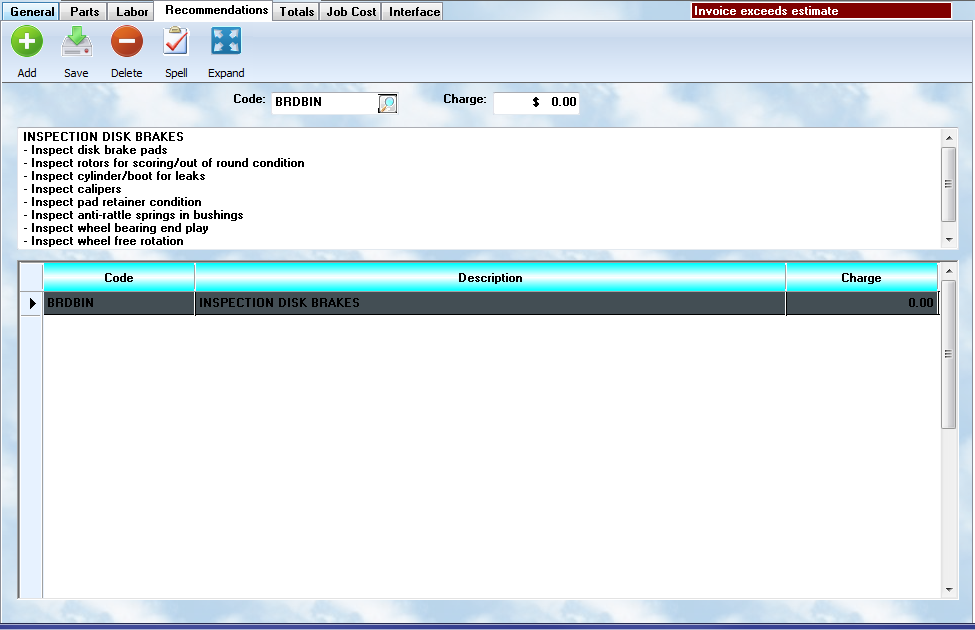Your clients look for professional advice about the upkeep and periodic service of their equipment.
As the technician services the unit, checks should be made of routine wear, and parts prone to failure. Notes should be made during this inspection, and any areas of concern should be noted on the workorder. In addition, upcoming services, tips about vehicle operation, and specific problem clues the operator may detect can all be noted.
Relying on verbal communication is just not sufficient, and does not enhance the probability of repeat business.
Recommendations are added to the workorder in a manner similar to labor. They are entered on the following screen.

The Charge field should specify the anticpated total cost, including parts and labor, for this service.Remember to press the ![]() button before entering a labor code, and the
button before entering a labor code, and the ![]() button when your work is complete. You may use a B code to include work not found in the glossaries.
button when your work is complete. You may use a B code to include work not found in the glossaries.
Recommendations are your first marketing tool. They also keep your client informed about the status of their vehicle. This is one area of the program which you never want to overlook !
Entering Recommendations
Recommendations use the labor glossary entries, and employ their full lookup capability. However, most shops will also have some entries which are only for recommendation.
If no code exists that states the appropriate message, the operator may enter a B for blank lines.
To Add a recommendation, simply select the Add button. Then add a service code. When a code is entered, or the lookup system is used, the service description will be displayed on the screen. Simply enter the anticipated total charge estimated for the service, and select the OK button to save the entry on the recommendation listing.
Editing A Description
If a change needs to be made to a recommendation, then the summary line should be highlighted. All fields will then be displayed in the upper portion of the screen, and can be edited as needed.
Please see the discussion under Editing Labor Descriptions for detailed instructions in this area. Be sure to select the OK button to save your changes.
It is an excellent plan to personalize the recommendation. Changes made to the text on the workorder will not affect the master glossary entry. For this reason, a core entry can be created which is then modified on each workorder. Brake wear statements are an excellent example of this procedure.
The following entry may be quite easily modified for each individual workorder:
BRAKE LINING: Your remaining brake lining is:
___ Left Front ___Right Front ___ Left Rear ___ Right Rear
Brakes should be checked again by: __/__/__
Brakes are a key safety feature of your vehicle. Failure to check them
periodically is very dangerous.
The code RE-BR could be used to call up this glossary for every workorder. The changes could be typed in quickly (replacing the _ with actual values), making each personalized, but eliminating any great amount of typing. When the changes are completed, press the F10 save key. The system will then open the Code and Price fields to be changed if necessary.
*** SPECIAL NOTE *** If the glossary code field is changed, it will react differently in reports. Consequently, you may wish to only modify the code in very special cases.
Price
The price refers to the approximate charge for the service labor, plus parts.